Module 11 Body language Unit 3 Language in use 语法课件(共16张)
文档属性
| 名称 | Module 11 Body language Unit 3 Language in use 语法课件(共16张) |  | |
| 格式 | zip | ||
| 文件大小 | 980.5KB | ||
| 资源类型 | 教案 | ||
| 版本资源 | 外研版 | ||
| 科目 | 英语 | ||
| 更新时间 | 2020-06-05 13:32:01 | ||
图片预览

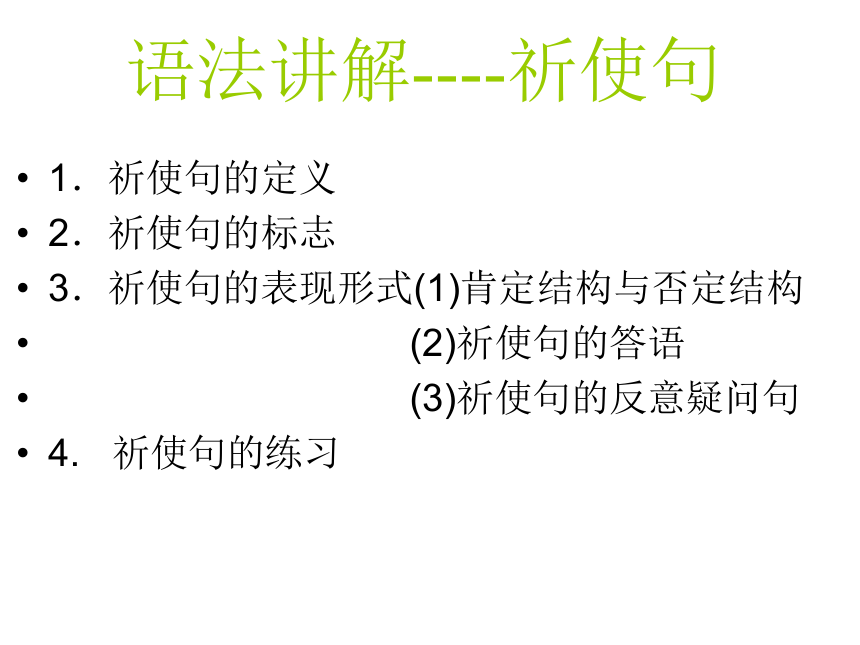

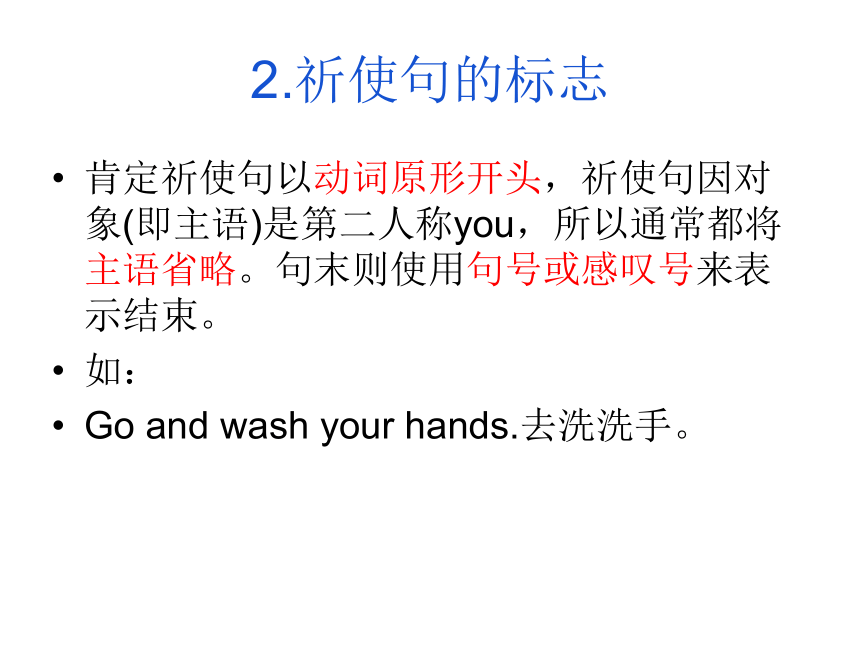
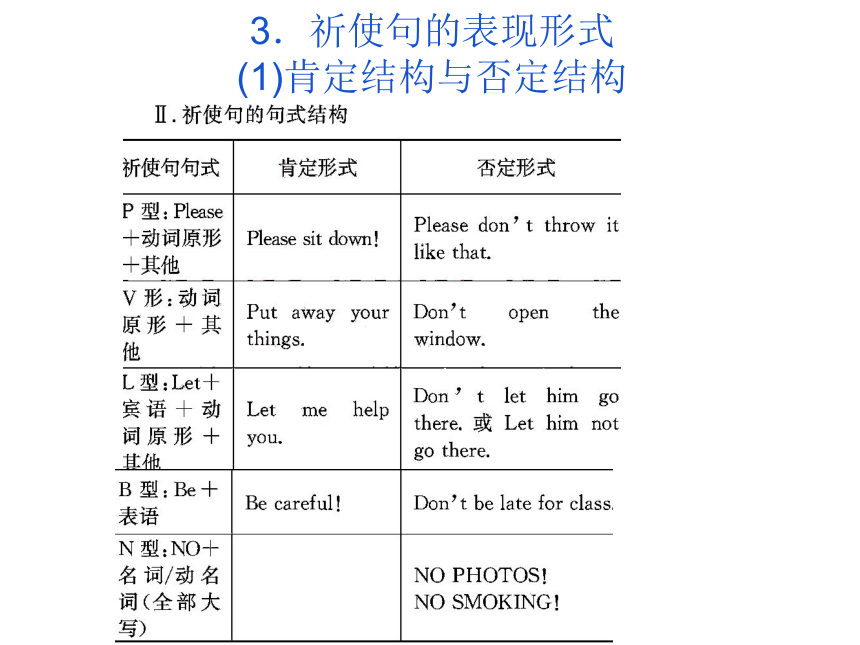
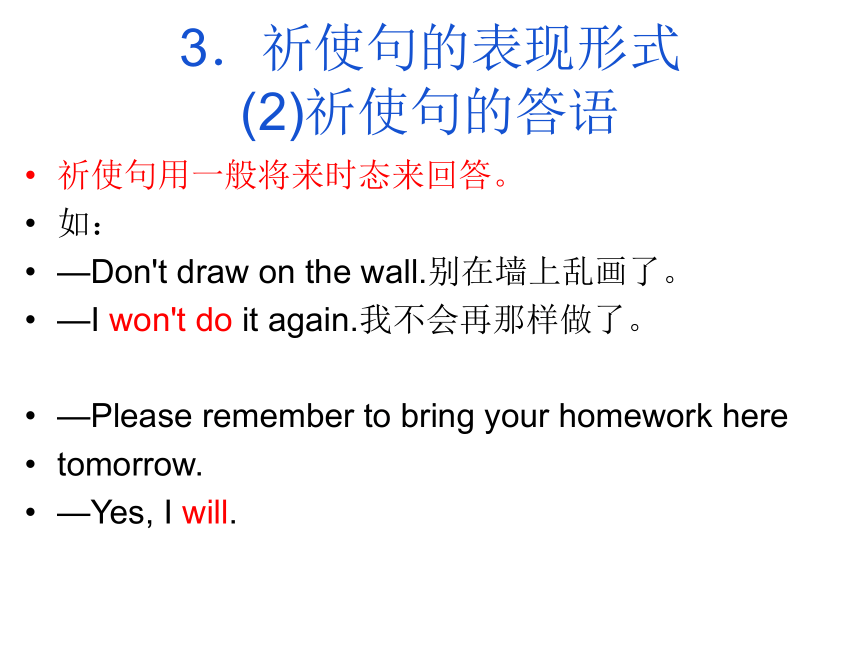
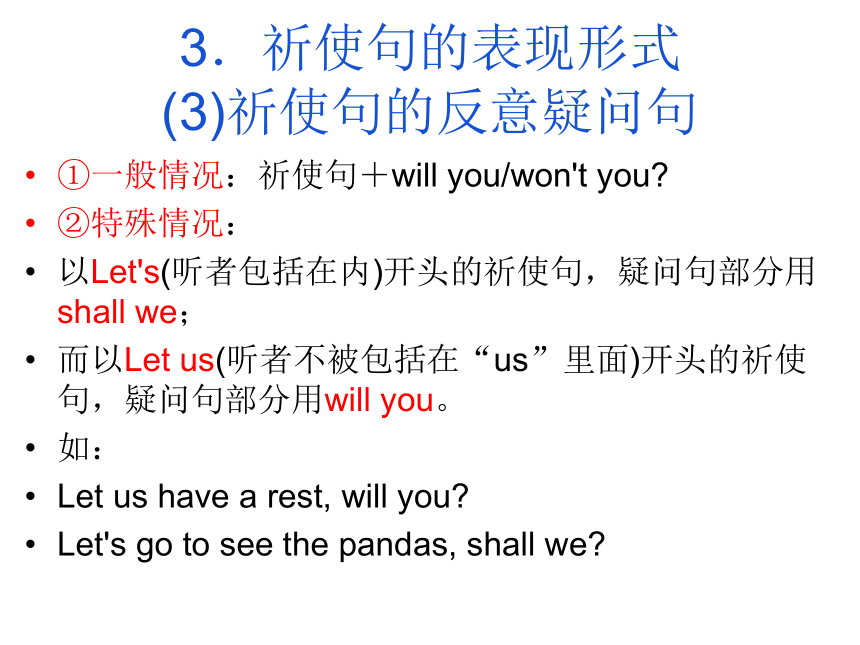
文档简介
(共16张PPT)
学习目标
1.能够读对读熟M11的新单词,背过U1单词并掌握重点单词的用法。
2.系统学习并掌握本模块的语法:祈使句
1.祈使句的定义
2.祈使句的标志
3.祈使句的表现形式(1)肯定结构与否定结构
(2)祈使句的答语
(3)祈使句的反意疑问句
4.
祈使句的练习
语法讲解----祈使句
1.祈使句的定义
用于表达命令、请求、劝告、警告、禁止等的句子叫作祈使句。
2.祈使句的标志
肯定祈使句以动词原形开头,祈使句因对象(即主语)是第二人称you,所以通常都将主语省略。句末则使用句号或感叹号来表示结束。
如:
Go
and
wash
your
hands.去洗洗手。
3.祈使句的表现形式
(1)肯定结构与否定结构
3.祈使句的表现形式
(2)祈使句的答语
祈使句用一般将来时态来回答。
如:
—Don't
draw
on
the
wall.别在墙上乱画了。
—I
won't
do
it
again.我不会再那样做了。
—Please
remember
to
bring
your
homework
here
tomorrow.
—Yes,
I
will.
3.祈使句的表现形式
(3)祈使句的反意疑问句
①一般情况:祈使句+will
you/won't
you?
②特殊情况:
以Let's(听者包括在内)开头的祈使句,疑问句部分用shall
we;
而以Let
us(听者不被包括在“us”里面)开头的祈使句,疑问句部分用will
you。
如:
Let
us
have
a
rest,
will
you?
Let's
go
to
see
the
pandas,
shall
we?
4.专项练习1
Ⅰ.单项选择。
(
)1.The
TV
is
too
loud.Please________.
A.to
turn
down
it
B.turn
down
it
C.turn
it
down
D.to
turn
it
down
(
)2.
________
swim
alone
in
the
river,
________?
A.Not;don't
you
B.Not;do
you
C.Don't;will
you
D.Don't;shall
we
(
)3.—Sorry
for
being
late
again.
—_______here
on
time
next
time,
or
you’ll
be
punished.
A.
Be
B.
Being
C.
To
be
D.
Been
(
)4.
________
play
with
fire.
________
with
fire
is
dangerous.
A.Don't;Playing
B.Not;Playing
C.Don't;Play
D.Not
to;To
play
(
)5.—Don’t
be
late
again,
Mike?
—_______________.
A.No,
I
don’t
B.Don’t
worry
C.Sorry,
I
won’t
D.I
don’t
know
4.专项练习2
Ⅱ.按要求完成句子,每空一词。
1.Move
the
desk
to
another
room.(改为否定句)
_____
______
the
desk
to
another
room.
2.It's
important
to
go
to
school
early.(用please改为祈使句)
_____
_____
school
early
next
time,
______.
3.Play
soccer
on
the
street.(改为否定句)
_____
_____soccer
on
the
street.
4.Let
us
go
to
school
together.(改为反意疑问句)
Let
us
go
to
school
together,
_____
______?
Let's
go
to
school
together,
_____
______?
练习:
将下列汉语翻译成英语。
1.
请照看好您的包。
___________________.
2.
让我们去学校吧!
___________________!
3.
亲爱的,高兴点儿!
___________________!
4.
不要把书放这儿。
___________________.
5.
不要让猫进来。
___________________.
Please
look
after
your
bag.
Let's
go
to
school.
Be
glad,
dear
Don't
put
the
book
here
.
Don't
let
the
cat
come
in
/Let
the
cat
not
come
in
.
1
work
in
pairs.
Talk
about
do’s
and
don’ts
in
a
foreign
country.
Do’s
Don’ts
Britain
Stand
in
line.
Shake
hands.
Say
“please”
and
“thank
you”.
Open
doors
for
others.
Look
at
people
when
you
talk.
Be
on
time.
Touch
people.
Ask
a
woman’s
age.
Stand
too
close.
Say
anything
too
personal.
3
Rewrite
the
sentences.
It’s
important
to
listen
to
the
teacher.
Listen
to
the
teacher.
You
cannot
shout
in
the
classroom.
Don’t
shout
in
the
classroom.
1.
It’s
important
to
be
careful.
2.
It’s
important
to
clean
and
tidy
the
lab.
3.
You
cannot
touch
anything
if
the
teacher
doesn’t
ask
you
to.
4.
You
cannot
bring
food
or
drink
into
the
lab.
5.
You
cannot
enter
the
lab
alone.
Answer
the
questions.
Use
the
words
and
expressions
from
the
box
to
help
you.
all
right
arm
in
arm
close
different
hold
on
to
kiss
three
times
point
at
shake
hands
with
wave
1.How
do
the
British
say
hello
to
each
other
when
they
first
meet?
2.
Does
body
language
mean
the
same
thing
in
different
countries?
They
shake
hands
with
each
other.
No
,
it
doesn’t.
3.
How
do
the
Russians
say
hello
to
each
other
when
they
meet?
4.
Is
it
polite
to
stand
close
to
North
Americans?
5.
Is
it
all
right
to
wave
goodbye
in
Greece?
6.
How
do
you
usually
say
goodbye
with
body
language?
They
usually
kiss
three
times.
No
,it
isn’t.
No
,it
isn’t.
I
wave
my
hand.
Around
the
w
rld
The
Japanese
bow
In
Japan,
people
bow
to
say
“thank
you”,
“sorry”
,“hello”,“goodbye”,
“you’re
welcome”,“excuse
me”,
and
many
other
things.
Children
and
young
people
bow
lower
when
they
greet
older
people.
It’s
a
way
of
being
polite
and
showing
respect.
Homework
1.M11U1单词背过,并在作业本上写音标默单词+汉意1遍,红笔批改。
2.把今天讲的单词用法及语法知识整理到错题本上。
学习目标
1.能够读对读熟M11的新单词,背过U1单词并掌握重点单词的用法。
2.系统学习并掌握本模块的语法:祈使句
1.祈使句的定义
2.祈使句的标志
3.祈使句的表现形式(1)肯定结构与否定结构
(2)祈使句的答语
(3)祈使句的反意疑问句
4.
祈使句的练习
语法讲解----祈使句
1.祈使句的定义
用于表达命令、请求、劝告、警告、禁止等的句子叫作祈使句。
2.祈使句的标志
肯定祈使句以动词原形开头,祈使句因对象(即主语)是第二人称you,所以通常都将主语省略。句末则使用句号或感叹号来表示结束。
如:
Go
and
wash
your
hands.去洗洗手。
3.祈使句的表现形式
(1)肯定结构与否定结构
3.祈使句的表现形式
(2)祈使句的答语
祈使句用一般将来时态来回答。
如:
—Don't
draw
on
the
wall.别在墙上乱画了。
—I
won't
do
it
again.我不会再那样做了。
—Please
remember
to
bring
your
homework
here
tomorrow.
—Yes,
I
will.
3.祈使句的表现形式
(3)祈使句的反意疑问句
①一般情况:祈使句+will
you/won't
you?
②特殊情况:
以Let's(听者包括在内)开头的祈使句,疑问句部分用shall
we;
而以Let
us(听者不被包括在“us”里面)开头的祈使句,疑问句部分用will
you。
如:
Let
us
have
a
rest,
will
you?
Let's
go
to
see
the
pandas,
shall
we?
4.专项练习1
Ⅰ.单项选择。
(
)1.The
TV
is
too
loud.Please________.
A.to
turn
down
it
B.turn
down
it
C.turn
it
down
D.to
turn
it
down
(
)2.
________
swim
alone
in
the
river,
________?
A.Not;don't
you
B.Not;do
you
C.Don't;will
you
D.Don't;shall
we
(
)3.—Sorry
for
being
late
again.
—_______here
on
time
next
time,
or
you’ll
be
punished.
A.
Be
B.
Being
C.
To
be
D.
Been
(
)4.
________
play
with
fire.
________
with
fire
is
dangerous.
A.Don't;Playing
B.Not;Playing
C.Don't;Play
D.Not
to;To
play
(
)5.—Don’t
be
late
again,
Mike?
—_______________.
A.No,
I
don’t
B.Don’t
worry
C.Sorry,
I
won’t
D.I
don’t
know
4.专项练习2
Ⅱ.按要求完成句子,每空一词。
1.Move
the
desk
to
another
room.(改为否定句)
_____
______
the
desk
to
another
room.
2.It's
important
to
go
to
school
early.(用please改为祈使句)
_____
_____
school
early
next
time,
______.
3.Play
soccer
on
the
street.(改为否定句)
_____
_____soccer
on
the
street.
4.Let
us
go
to
school
together.(改为反意疑问句)
Let
us
go
to
school
together,
_____
______?
Let's
go
to
school
together,
_____
______?
练习:
将下列汉语翻译成英语。
1.
请照看好您的包。
___________________.
2.
让我们去学校吧!
___________________!
3.
亲爱的,高兴点儿!
___________________!
4.
不要把书放这儿。
___________________.
5.
不要让猫进来。
___________________.
Please
look
after
your
bag.
Let's
go
to
school.
Be
glad,
dear
Don't
put
the
book
here
.
Don't
let
the
cat
come
in
/Let
the
cat
not
come
in
.
1
work
in
pairs.
Talk
about
do’s
and
don’ts
in
a
foreign
country.
Do’s
Don’ts
Britain
Stand
in
line.
Shake
hands.
Say
“please”
and
“thank
you”.
Open
doors
for
others.
Look
at
people
when
you
talk.
Be
on
time.
Touch
people.
Ask
a
woman’s
age.
Stand
too
close.
Say
anything
too
personal.
3
Rewrite
the
sentences.
It’s
important
to
listen
to
the
teacher.
Listen
to
the
teacher.
You
cannot
shout
in
the
classroom.
Don’t
shout
in
the
classroom.
1.
It’s
important
to
be
careful.
2.
It’s
important
to
clean
and
tidy
the
lab.
3.
You
cannot
touch
anything
if
the
teacher
doesn’t
ask
you
to.
4.
You
cannot
bring
food
or
drink
into
the
lab.
5.
You
cannot
enter
the
lab
alone.
Answer
the
questions.
Use
the
words
and
expressions
from
the
box
to
help
you.
all
right
arm
in
arm
close
different
hold
on
to
kiss
three
times
point
at
shake
hands
with
wave
1.How
do
the
British
say
hello
to
each
other
when
they
first
meet?
2.
Does
body
language
mean
the
same
thing
in
different
countries?
They
shake
hands
with
each
other.
No
,
it
doesn’t.
3.
How
do
the
Russians
say
hello
to
each
other
when
they
meet?
4.
Is
it
polite
to
stand
close
to
North
Americans?
5.
Is
it
all
right
to
wave
goodbye
in
Greece?
6.
How
do
you
usually
say
goodbye
with
body
language?
They
usually
kiss
three
times.
No
,it
isn’t.
No
,it
isn’t.
I
wave
my
hand.
Around
the
w
rld
The
Japanese
bow
In
Japan,
people
bow
to
say
“thank
you”,
“sorry”
,“hello”,“goodbye”,
“you’re
welcome”,“excuse
me”,
and
many
other
things.
Children
and
young
people
bow
lower
when
they
greet
older
people.
It’s
a
way
of
being
polite
and
showing
respect.
Homework
1.M11U1单词背过,并在作业本上写音标默单词+汉意1遍,红笔批改。
2.把今天讲的单词用法及语法知识整理到错题本上。
同课章节目录
- Module 1 Lost and found
- Unit 1 Whose bag is this?
- Unit 2 Are they yours?
- Unit 3 Language in use
- Module 2 What can you do ?
- Unit 1 I can play the piano
- Unit 2 I can run really fast
- Unit 3 Language in use
- Module 3 Making plans
- Unit 1 What are you going to do at the weekends?
- Unit 2 We're going to cheer the players.
- Unit 3 Language in use
- Module 4 Life in the future
- Unit 1 Everyone will study at home
- Unit 2 Every family will have a small plane.
- Unit 3 Language in use
- Module 5 Shopping
- Unit 1 What can I do for you?
- Unit 2 You can buy everything on the Internet
- Unit 3 Language in use
- Module 6 Around town
- Unit 1 Could you tell me how to get to the Nationa
- Unit 2 The London Eye is on your right.
- Unit 3 Language in use
- Revision module A
- Module 7 My past life
- Unit 1 I was born in a small village.
- Unit 2 I was born in Quincy.
- Unit 3 Language in use
- Module 8 Story time
- Unit 1 Once upon a time….
- Unit 2 Goldilocks hurried out of the house.
- Unit 3 Language in use
- Module 9 Life history
- Unit 1 He left school and began work at the age of
- Unit 2 He decided to be an actor.
- Unit 3 Language in use
- Module 10 A holiday journey
- Unit 1 What did you do?
- Unit 2 This morning we took a walk.
- Unit 3 Language in use
- Module 11 Body language
- Unit 1 They touch noses!
- Unit 2 Here are some ways to welcome them.
- Unit 3 Language in use
- Module 12 Western music
- Unit 1 It's so beautiful!
- Unit 2 Vienna is the centre of European classical
- Unit 3 Language in use
- Revision module B
